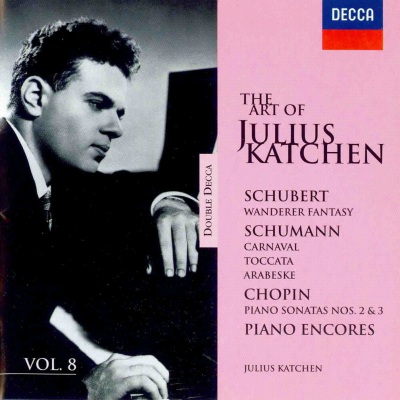
The Art of Julius Katchen, Vol.8
Review by: Jed Distler Volume 8 in Australian Decca’s Julius Katchen series offers rare solo recordings from the 1950s and ’60s. Most of these are new to CD and considerably flesh out what we know of the short-lived pianist’s artistry beyond his acclaimed solo Brahms cycle. He rides the gnarly technical hurdles of Schubert’s Wanderer Fantasie without a trace of compromise. He doesn’t slam down the brakes to accommodate the opening movement’s octave scales, and likewise keeps the second movement “Wanderer” theme afloat by not mooning over the right hand filigree. Rhetorical touches in the finale, however, distract more than they illuminate, and ditto for the pianist’s Schumann Arabesque. Katchen’s extroverted side is blown up to IMAX proportions in the Schumann Carnaval. It’s packed to the rafters with surreal rubatos, wacky inner voices, and fast movements fueled with extra caffeine. As if that weren’t enough, Katchen plays the forbidden “Sphinxes”, dolling up the cryptic notes with tremolos à la Rachmaninov. It’s the most insane Carnaval I’ve ever heard, and I love every bar of it! If Schumann’s Toccata gets a similarly unbridled spin, the Chopin Second and Third Sonatas unfold with intelligent calm and direct musicality. Highlights from Katchen’s 1961 “Encores” collection include his rip-roaring, light-fingered Mendelssohn Andante and Rondo Capriccioso and a lusciously voiced Bach/Hess Jesu, Joy of Man’s Desiring. His heartfelt rendition of the Mendelssohn/Liszt On Wings of Song evokes the ghosts of pianists past, all of whom had a knack for such chestnuts (Arthur Loesser used to call them “cream of corn”). Lastly, Katchen serves up two crowd-pleasers long associated with Artur Rubinstein (Claire de lune and the Ritual Fire Dance). Unfortunately, Katchen’s fussy right hand flame throwing is bereft of solid, left-hand underpinning. Yet Katchen fulfills every pianistic dare he undertakes in an overpowering romp through Chopin’s A-flat Polonaise. The heart-stopping results rank with Rubinstein, Horowitz, Cliburn, and Lhevinne among the best-recorded versions of this war-horse. Excellent annotations are provided, but no information regarding recording dates and venues. All in all, a treasure for piano collectors to savor. Artist Biography by Erik Eriksson A child prodigy of startling promise, Julius Katchen matured into a solo and chamber music pianist of broad interests and probing artistry. His death from cancer at age 42 denied a discerning public the presence of a pianist especially well-equipped to penetrate to the center-most meanings of those works he favored. Born to a musical family, Katchen was instructed in the musical arts from his earliest years. His grandmother, formerly a faculty member at the Warsaw Conservatory, was his first piano instructor, while his grandfather taught him theory (his mother, a pianist, had trained at the Fontainebleau School of Music and had made concert appearances in both Europe and America). In 1937, Katchen presented himself to Eugene Ormandy and requested that he be permitted to play for him. Ormandy was sufficiently impressed to engage the lad for an appearance with the Philadelphia Orchestra. The October 21, 1937, concert found Katchen performing Mozart's Concerto in D minor to high praise. Following this glowing reception, the 11-year-old pianist was invited to perform at a pension fund concert with the New York Philharmonic the following month. Critic Lawrence Gilman was moved to recall the debut of Josef Hofmann as a prodigy a half century before. "His fingers are fleet, his conceptions clear and intelligent," wrote Gilman of Katchen. "He has a musicianly feeling for the contour and flow and rhythm of a phrase and a sense of what is meant by Mozartean style." A New York recital a year later brought even more enthusiastic praise for the youth's musical understanding. Before his career advanced, however, Katchen's parents chose to place a hold on further public appearances and enroll him instead at Haverford College, where he majored in philosophy and English literature. His break, Katchen often insisted, developed in him the intellectual curiosity that fed his interest in the more mentally challenging works in the repertory. A fellowship extended by the French government permitted Katchen to travel to Paris in 1946; that cosmopolitan city became his home for the remainder of his life and he lost no time in making himself a formidable presence there and in the rest of Europe, respected for his commanding interpretive thoughtfulness and virtuoso technique. He undertook several highly successful tours of the Continent, winning acclaim in each center he visited. Decca Records signed him to an exclusive contract and he began recording a bracing cross-section of the repertory with Brahms always at the core. He presented concert performances of Brahms' complete solo piano works in New York, London, Amsterdam, Vienna, and Berlin and was heard with major orchestras in the two piano concertos. In addition to solo appearances, Katchen often took part in chamber music performances, again concentrating on Brahms, but certainly not neglecting other aspects of an extensive personal repertory. Ned Rorem and Benjamin Britten were just two contemporary composers to benefit from Katchen's advocacy. To say, as some have, that Katchen never achieved the success in America that was his in Europe fails to account for the far greater portion of his mature years that were spent on the Continent where other cultural stimulations prompted his most involved and productive work. Katchen was also acutely aware of the need to extend the exposure of classical music well beyond its existing ranks -- on December 11, 1968, he was one of a large group of musicians, all but one of them from the rock and blues fields, to perform as part of the Rolling Stones' Rock & Roll Circus, and a segment that was introduced by Brian Jones, no less; alas, due to production and post-production problems, no one got to see any part of Katchen's performance until over three decades later; the pianist himself, terminally ill with cancer, didn't live another six months after this extraordinary event. His tragic death was keenly felt on both sides of the Atlantic.
